Image: Shutterstock
Blog Editor’s Note: There is a lot to unpack in this short news item.
NCS spokesman Kirby’s response to the Russians was established U.S. government policy. The “National Space Policy of the United States” issued in 2020 says:
“The United States considers the space systems of all nations to have the right to pass through and conduct operations in space without interference. Purposeful interference with space systems, including supporting infrastructure, will be considered an infringement of a nation’s rights. Consistent with the defense of those rights, the United States will seek to deter, counter, and defeat threats in the space domain that are hostile to the national interests of the United States and its allies. Any purposeful interference with or an attack upon the space systems of the United States or its allies that directly affects national rights will be met with a deliberate response at a time and place of our choosing.”
Something to notice is that the policy doesn’t just talk about satellites. It says “space systems, including supporting infrastructure.” So cyber attack, jamming, spoofing, and such are included.
Also notice it has a degree of threat. Like the U.S. nuclear declaratory policy, it uses “calculated ambiguity.” This can deter a potential aggressor by causing them to wonder what will happen in a give situation, allows the U.S. to keep its options open, and lets decision makers tailor responses to specific acts. And “deliberate response at a time and place of our choosing” sounds pretty ominous.
Most would agree that direct (kinetic and directed energy) attacks on satellites are unlikely. Such attacks are difficult to mount, easy to attribute, and would likely have limited impact since most satellites are part of a constellation. Even a small constellation like GPS would have to have five or six satellites destroyed to make a real impact. Even then constellations like GPS that have on-orbit spares can b reconstituted fairly quickly. Also, physically destroying one or more satellites would create debris endangering the attacker’s own space-based assets. Perhaps most importantly, a physical attack is direct and overt, and impossible to ignore. So it would almost certainly start a shooting war that would end poorly for everyone.
Much more likely are electronic warfare and cyber attacks. These can range from jamming and spoofing GPS signals in Ukraine and elsewhere (has the US government ever really responded to that?), to disrupting communications and/or PNT signals over very broad areas. – We saw a report a couple years ago about Russia developing an nuclear powered electronic warfare satellite. That could likely block a range of signals across one face of the planet.
Electronic and cyber attacks have few of the disadvantages of physically destroying satellites, much greater impact on users, and could be hard to attribute. They also have the advantage of being reversable. When the attacker got what they wanted, they could just switch things off. Always retaining the option, of course, of turning it on again. – Hmmm, how might we protect ourselves from being held hostage like that in the PNT world…?
Still, conflicts of any kind between major powers can be dangerous. There is always the chance, whether in space or on the surface, of a minor incident leading to a tit for tat that spirals out of control. Then, suddenly, they are both in an war neither wanted. See George Beebe’s “The Russia Trap” for a discussion and historical examples.


U.S. National Security Council communications spokesman John Kirby warned Russia at a press conference Thursday that the United States will respond to possible attacks on its satellites following threats by a Russian official.
“I will simply say that any attack on U.S. infrastructure will be met with a response and will be appropriate to the threat it poses to our infrastructure,” he explained at a press conference, advanced by DPA.
These words come after the deputy head of the Russian Foreign Ministry’s Department for Non-Proliferation and Arms Control, Konstantin Vorontsov, assured a meeting of a United Nations General Assembly committee that U.S. commercial satellites “could become legitimate targets for attack” if they are deployed as part of the conflict in Ukraine.


